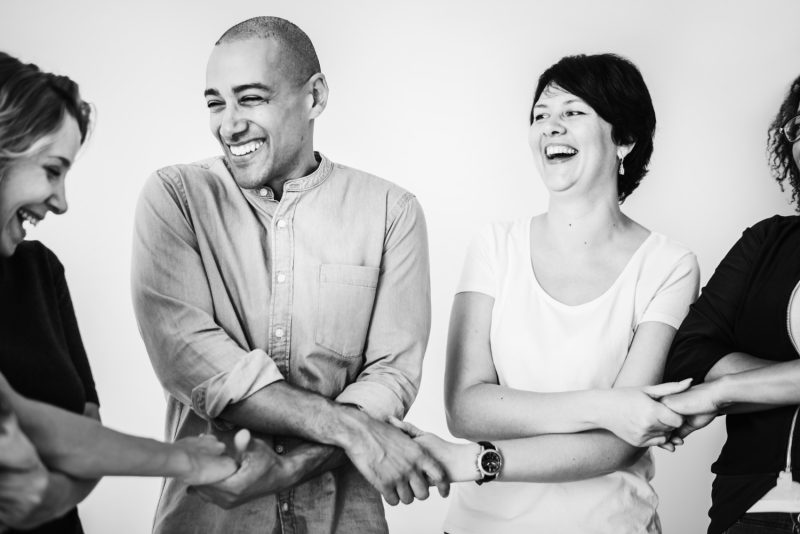In the grand scheme of ‘’teams,” personal well-being is often overlooked. Ever heard the saying, “There’s no ‘I’ in team“? As it turns out, being a team player doesn’t just benefit the collective; it can have an incredible effect on your individual well-being too.
The impact of positive thinking and actions within a working group extends far beyond a simple mood boost. From improving mental health to enhancing job satisfaction, many different studies have shown that positive team dynamics are a potent force for personal contentment. Buckle up, it is time to dive into the exciting world of positive, productive teamwork and discover how they can supercharge your well-being!
The neuroscience of teamwork and well-being
Before delving into how teamwork benefits your well-being, it is imperative to first know the physiological mechanisms that occur in one’s body when effective teamwork is achieved. By understanding neurobiological processes, such as the release of oxytocin and the activation of mirror neurons, you may be able to enhance your appreciation for the significance of good collaboration.
The role of neurotransmitters in teamwork
The science is clear: humans are inherently social creatures. When individuals work harmoniously, the brain releases oxytocin, often called the “bonding hormone”, promoting feelings of trust, empathy, and connection among team members. As a result, the team establishes and reinforces social bonds, contributing to a sense of belonging and cohesion.
Teamwork can also activate the brain’s reward system, particularly the release of dopamine. Dopamine is a neurotransmitter associated with pleasure, motivation, and reinforcement of behaviors. When individuals collaborate effectively within a team, accomplish tasks together, or achieve shared goals, the brain’s dopamine system is stimulated. This creates a sense of accomplishment and satisfaction, boosting well-being and motivation to continue working as a team.
The activation of mirror neurons
In addition, positive teamwork can trigger the activation of mirror neurons. Mirror neurons are specialized cells in the brain that fire when an individual observes someone else acting as if the observer were performing that action themselves. These neurons help you empathize and understand the emotions and intentions of others.
In teamwork, mirror neurons come into play when team members observe each other’s actions and reactions. This helps create empathy, understanding, and the ability to anticipate and respond to the needs of others, contributing to a positive team dynamic and overall well-being.
The neurobiology of teamwork and well-being shows the profound impact that positive social interactions, collaboration, and a sense of belonging within a team can have on the brain. Now, let’s dig deeper into the concrete benefits of positive team dynamics and how they directly contribute to individual well-being.
The personal benefits of teamwork
Teamwork is a fundamental aspect of human interaction that extends far beyond the professional realm. The advantages of working collaboratively with others are diverse and far-reaching, and below are just some of the many personal benefits of teamwork:
Stress reduction and mental health
Positive team dynamics can be your shield against stress. A supportive team can provide emotional validation, reducing feelings of isolation and anxiety. Collaborative work environments nurture open communication, making it easier to share concerns and find solutions. Research even suggests that individuals in positive teams are less likely to experience burnout or depression.
Read more: Why Compassion for Colleagues Matters
Job satisfaction and productivity
Do you find joy in your work? Positive team dynamics can significantly impact job satisfaction. When you feel valued and supported by your colleagues, it’s easier to find fulfillment in your tasks. As your job satisfaction increases, so does your motivation and productivity. Happier individuals are more likely to take on challenges, learn new skills, and excel in their careers.
Skills development and personal growth
In a positive team, you are encouraged to learn and grow. Collaborating with diverse skill sets and personalities can expand your own knowledge and abilities. Constructive feedback from teammates helps you improve and reach your full potential. Personal growth is a cornerstone of well-being, and a positive team environment provides fertile ground for it to flourish.
Building resilience
Teams face obstacles and setbacks together, providing an opportunity to develop resilience. When you conquer challenges as a team, you become more adaptable and better equipped to handle future difficulties in your personal and professional life. Positive team dynamics reinforce the idea that you are not alone in facing adversity, boosting your confidence and mental fortitude.
Fun and camaraderie
Let’s not forget the sheer fun of being part of a positive team. Sharing jokes, celebrating victories, and overcoming obstacles together can be immensely enjoyable. These moments of camaraderie contribute to a sense of belonging and well-being, reminding you that work and life are about more than just tasks and deadlines.
Tips for cultivating positive team dynamics
Here are some practical ways to harness the power of positive team dynamics for your well-being:
Effective communication
Foster open, respectful, and empathetic communication among team members. Try the following steps:
- Clear expectations: Start by defining clear expectations for communication within the team. Everyone should understand how, when, and where they are expected to communicate.
- Active listening: Encourage team members to practice active listening. When someone is speaking, others should listen attentively without interrupting, showing that they value the speaker’s perspective.
- “Open-Door” policy: Maintain an open-door policy to make team members feel comfortable approaching you with questions, concerns, or suggestions at any time.
- Regular team meetings: Schedule regular team meetings to discuss progress, challenges, and updates. These meetings should provide a safe space for team members to share their thoughts and concerns.
- Empathy training: Consider organizing workshops or training sessions to improve empathy within the team. This can help team members better understand each other’s feelings and viewpoints.
Read more: Overcoming Blame Game: Fostering Healthy Communication in Personal Life
Trust and collaboration
Build trust through shared goals and mutual respect, and promote collaboration in problem-solving. Strategies to improve trust within the team include:
- Defining team goals: Clearly define team goals and objectives, ensuring that every team member understands their role in achieving them.
- Promoting mutual respect: Encourage team members to treat each other with respect and dignity. Address any disrespectful behavior promptly and constructively.
- Transparency: Foster an environment of transparency by sharing information and decisions openly. This helps build trust among team members.
Recognition and appreciation
Recognize and appreciate your team members’ contributions, both individually and collectively. These can be in the form of:
- Regular feedback: Provide regular, constructive feedback to team members to acknowledge their efforts and offer areas for improvement.
- Individual recognition: Recognize individual achievements in team meetings or through personalized notes and messages. Highlight specific contributions and their impact.
- Collective recognition: Celebrate team successes as a group. Organize events or small rewards to recognize the collective efforts that led to achievements.
- Peer recognition: Encourage team members to appreciate each other’s efforts. Peer recognition can be very powerful in building a positive atmosphere.
- Awards and incentives: Consider creating an awards system or providing incentives for outstanding contributions to motivate team members.
Conflict resolution
Address conflicts promptly and constructively to maintain a positive team environment. Approach conflict with care, making sure to conduct the following actions:
- Open communication: Encourage team members to express their concerns and issues openly. Create a safe space for honest discussions.
- Mediation: When conflicts arise, act as a mediator or designate someone to help resolve the issue impartially.
- Seeking common ground: Encourage the parties in conflict to find common ground and work towards a mutually acceptable solution.
Team-building activities
Participate in team-building exercises or activities to strengthen bonds and improve teamwork. Activities like trust falls, problem-solving games, or group discussions can be effective.
In conclusion
Positive team dynamics enhance not only collective but also individual well-being. By actively encouraging positive team interactions and a supportive work environment, you can reap the rewards of improved mental health, greater job satisfaction, and a deeper sense of personal contentment.
Whether you’re at the office, on a sports team, or collaborating on a project, remember that positive team dynamics aren’t just good for the team; they’re a recipe for individual well-being too. When it comes to well-being, there truly is an “I” in “team”!
If you would like to see more resources on teamwork, check out the Wellbeing Science Labs. The lab uses the research of the Institute for Life Management Science to produce courses, certifications, podcasts, videos, and other tools. Visit the Wellbeing Science Labs today.
Photo by rawpixel.com on Freepik


